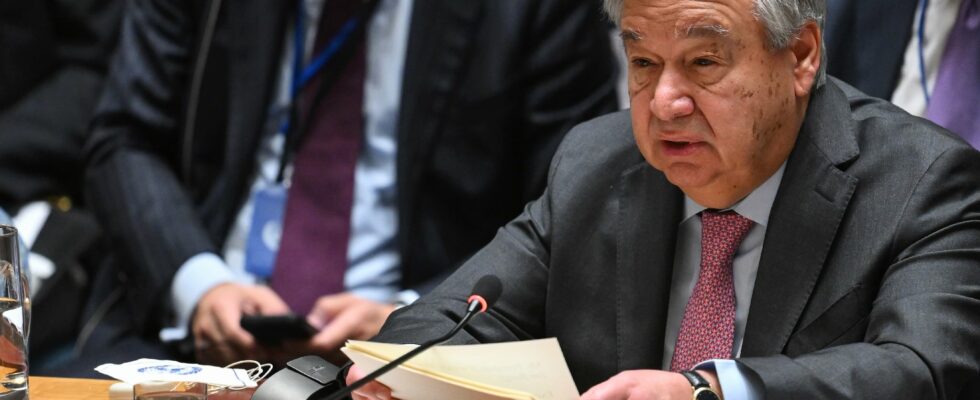A breaking point has been reached, between the UN and the State of Israel. This Wednesday, October 2, the Israeli Minister of Foreign Affairs, Israel Katz, announced that he had declared the Secretary General of the United Nations, Antonio Guterres, “persona non grata in Israel”. To justify this decision, the representative of Benjamin Netanyahu’s government criticizes him for not having condemned Iran by name for its massive attack against Israel on Tuesday evening.
If Israel was already very critical of the United Nations, this decision marks a new stage in the slow deterioration of ties between the international organization and the Israeli government. A conflictual relationship born from the Israeli occupation of the Palestinian territories and which has quickly deteriorated since the Hamas attack of October 7, 2023.
A condemnation of escalation without mentioning Iran
For the Israeli government, this Wednesday’s break has its origins in a statement Tuesday by the UN Secretary General. After the attack by Iran which fired nearly 200 missiles at Israel in the evening, Antonio Guterres condemned “the widening of the conflict in the Middle East”, deploring “escalation after escalation”. Believing that a “total war in Lebanon must be avoided at all costs”, he demanded “a ceasefire” between the Israeli army and Hezbollah.
I condemn the broadening of the Middle East conflict with escalation after escalation.
This must stop.
We absolutely need a ceasefire.
— António Guterres (@antonioguterres) October 1, 2024
A few hours later, the ax fell on the Israeli side: “Anyone who cannot unequivocally condemn Iran’s heinous attack on Israel does not deserve to set foot on Israeli soil. We are dealing with an anti-Israeli secretary general who supports the terrorists, rapists and murderers,” Israel Katz said in a statement on Wednesday.
The Minister of Foreign Affairs also justified this decision by the fact that Guterres has “not yet denounced the massacre of October 7, […] nor condemned the use of sexual violence by Hamas,” reports the Israeli daily newspaper Jerusalem Post. Two assertions, however, denied and contradicted by the UN in October 2023 And March 2024. “Israel will continue to defend its citizens and defend its national dignity, with or without Antonio Guterres,” concluded Israel Katz, quoted by the Israeli newspaper.
The gap has been widening since October 7
Although Antonio Guterres ultimately “strongly condemned Iran’s massive missile attack on Israel” a few hours laterthe statement by the Israeli minister illustrates the accelerated breakdown in relations between the Israeli state and the UN, since the Hamas attack on October 7, 2023. Shortly after the start of Israel’s war in Gaza against the Islamist movement, Israeli calls for Antonio Guterres’ resignation began when he stressed that the Hamas attack did not “happen in a vacuum” and that “the Palestinian people [avait] been subjected to 56 years of stifling occupation”. A reference to the Israeli policy of occupation of Palestinian territories initiated in 1967.
Tensions then increased over the role of the United Nations agency for Palestinian refugees, UNRWA. In January, Israel claimed that a number of agency staff had been involved in the attacks of October 7″, recalled this Wednesday the BBC. After an investigation leading to the dismissal of 9 of the 13,000 UNRWA employees in Gaza, the UN agency denounced the destruction of its infrastructure in the Gaza Strip, where 220 members were killed.
Subsequently, the multiple warnings from the UN concerning the humanitarian consequences of Israeli reprisals and the qualification of “genocide” among the UN ranks widened the gap. Last week, it was from the very podium of the UN General Assembly that Israeli Prime Minister Benjamin Netanyahu once again sounded the charge: “Until Israel […] “is treated like other nations, until this anti-Semitic swamp is drained, the UN will be considered by fair people as nothing more than a contemptuous farce,” he said on Thursday, September 26.
Initial support broken by Israeli colonization
Relations have not always been so stormy, however, tempers the German radio Deutsche Welle. Beyond the “midwife” role attributed to the UN in the creation of the Israeli state in 1947, the media reported at the end of March that Israel had moved closer to the UN executive in recent years. “In 2012, for example, the country appointed a vice president of the General Assembly for the first time, and in 2016 an Israeli was named chairman of the Committee on Legal Affairs.”
However, things changed “after the Six Day War of 1967 and the Israeli occupation of the Palestinian territories”, summarizes Deutsche Welle: “Relations between Israel and the UN deteriorated considerably and the number of critical resolutions at respect for Israel adopted by the General Assembly has skyrocketed. Since the creation of the Human Rights Council in 2006, more than a third of the 300 condemnation resolutions have targeted Israel, its ambassador in Geneva told AFP. An insistence perceived by Israel as a UN bias against it.
More broadly, the country has ignored since its creation in 1948 a multitude of UN resolutions and international court decisions condemning its actions. Neither resolution 194 on the right of return of Palestinians expelled during the creation of Israel, nor the condemnation of the occupation of territories conquered in 1967, nor that of the creation of illegal colonies have been respected. Therefore, several experts from the Human Rights Council (HRC) have expressed concern to the AFP about the long-term consequences for a United Nations Organization that is constantly questioned or ignored. For Pedro Arrojo-Agudo, the HRC’s expert on the right to drinking water, “we are going to blow up the UN if we do not react.”
